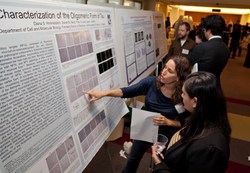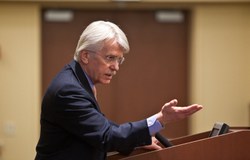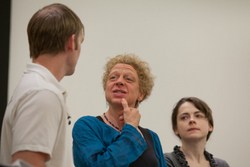
In a decade that saw fewer Americans die from heart disease, stroke, HIV, and breast cancer, Alzheimer’s disease (AD) claimed 68 percent more lives in 2010 than 2000.
“The science community stands poised to make key contributions to the field even though federal funding for AD research is horribly insufficient given the magnitude of the problem in this country,” said Alzheimer Day keynote speaker Ronald Petersen, MD, director of the Mayo Alzheimer’s Disease Research Center. “Expanded aid for cancer, heart disease, and HIV has paid off, but we have not experienced similar increases for AD research and are now seeing the consequences.”
Introduced to a crowd of nearly 500 students, staff, faculty, and community members by Marsel Mesulam, MD, Cognitive Neurology and Alzheimer’s Disease Center (CNADC) director and Ruth and Evelyn Dunbar Professor of Neurology, Petersen spoke for 45 minutes about current research gains and the ability of scientists to develop effective treatments in the future.
A professor of neurology at the Mayo Clinic, Petersen delivered the Mendelson Keynote Lecture as part of the 19th annual CNADC Alzheimer Day on Thursday, May 9. The event also featured a question-and-answer segment with Peterson, scientific poster session, panel discussion with clinicians, and performance of the play “Still Alice” by members of Lookingglass Theatre.

This year’s Marie and Carl Duncan Prize in Memory Research was awarded to Diana Himmelstein, a postdoctoral fellow in cell and molecular biology, for her presentation of work conducted with Lester Binder, PhD, Abbott Laboratories Duane and Susan Burnham Research Professor of Genetic and Molecular Medicine.
The project is part of the lab’s focus on the tau protein, one of the main pathological components found in Alzheimer’s and other neurodegenerative diseases. Tau is present in all brains to assist with normal neuronal functioning, however, in the disease state it folds incorrectly and forms protein aggregates, which are thought to result in synapse failure and neuronal dysfunction.
“Events such as Alzheimer Day demonstrate that many bright minds are ready to attack this disease,” Petersen said. “It also brings together the surrounding community to see how research at Feinberg is contributing to the field and to recognize that the CNADC helps make Northwestern one of the leading research universities in the country.”

Actors from the Lookingglass Theatre read a scene from “Still Alice,” a play about a woman who is at the peak of her career studying the human brain when her own mind begins to falter.
More than 5 million Americans are estimated to be living with Alzheimer’s disease, a figure that will grow as the U.S. population continues to age. By 2025, the number of people age 65 and older with AD is estimated to reach 7.1 million. By 2050, that number is projected to rise to 13.8 million, barring the development of medical breakthroughs to prevent, slow, or stop the disease.
“Alzheimer Day helps demystify the disease and can help people clarify some of the common misunderstandings of dementia,” said Jay Gottfried, MD, PhD, associate professor of neurology and a panelist during the afternoon Q&A. “One important point to be emphasized is that Alzheimer’s disease is not ‘the end of the road,’ and that there are ways to maintain a good quality of life.”
A handful of audience members – many of whom have the disease or are caretakers for someone living with AD – spoke to that affect, mentioning the role of support groups and activities like the CNADC Memory Ensemble.
Christine Mary Dunford, PhD, the Lookingglass member who helped conceive the Memory Ensemble, brought a few scenes from her latest theater production to the stage. In telling the story of a mother learning to live with dementia, “Still Alice” began the afternoon with a thought-provoking display of emotion, humor, and reality.
“I have never experienced as much interest in any project as I have from the Memory Ensemble and ‘Still Alice,’” Dunford said. “I like to think that part of this interest is because these are both great projects, but I also think it is because people are hungry for positive ways to address Alzheimer’s disease and dementia.”






